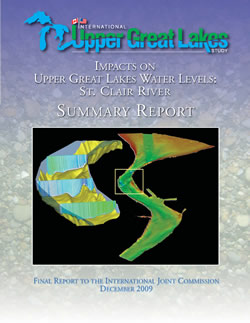
The IUGLS Phase 1 Report, December 2009. (pdf, 2.22 MB)
ALEXANDRIA,VA—February 22, 2011. During the first week of February, important workshops were held in Windsor, Ontario, in support of the International Upper Great Lakes Study (IUGLS) in its charge to investigate options to improve the management of Great Lakes levels. The workshops were facilitated by the Study’s Adaptive Management Technical Work Group which is assisting with plan formulation and also developing an institutional framework for adaptation beyond Study completion. Dr. Tony Eberhardt of IWR, who is the U.S. Study Manager, attended the workshops representing the Study Team.
On February 1st and 2nd, a workshop was held to address institutional/governance challenges and opportunities associated with the implementation of a new Lake Superior regulation plan. It also focused on institutional issues related to the concept of building new structures in the St. Clair River, as well as options for adapting Great Lakes shoreline uses to accommodate future fluctuating water levels. Participants included individuals from Environment Canada, various Ontario Provincial Conservation Authorities, the U.S. Federal Emergency Management Agency (FEMA), the Great Lakes Observing System (GLOS), and the USACE Detroit District and Great Lakes-Ohio River Division.
On February 3rd, a workshop was held to discuss potential environmental impacts that could result if structures were built in the St. Clair River to restore recently declining water levels in the upper lakes. Numerous environmental scientists from U.S. and Canadian government agencies and academia attended, including the US Geological Survey, First Nations, and the Minnesota, Michigan and Ohio Departments of Natural Resources, pointing out the less-than-desirable impacts that could result from the placement of structures in a highly productive spawning area. The IJC had asked the Study Team to investigate measures to restore from 10 to 50 cm of water on the upper lakes due to public concerns expressed after the release of the Study’s Phase 1 report in December 2009 regarding possible factors responsible for recent declining upper Great Lakes levels, and the finding that some could be attributed to dredging in the St. Clair River.
Information from both of these workshops will be compiled and provided to the IJC at their semi-annual hearings in Washington, DC, in April.
More about the International Upper Great Lakes Study
The International Upper Great Lakes Study (IUGLS) is a five-year study which began in 2007 to investigate the possible factors responsible for recent declining upper Great Lakes levels (Phase 1) and to formulate alternative plans for Lake Superior outflow regulation with the goal of providing benefits to existing and emerging interests (Phase 2). Investigations are being performed by dozens of scientists from U.S. and Canadian government and non-government agencies and universities around the Great Lakes. The Study is being managed and directed by IWR under a Memorandum of Agreement (MOA) between the Institute and the International Joint Commission (IJC). Drs. Eugene Stakhiv and Tony Eberhardt are the U.S. co-Director and co-Manager of the Study. IWR is leading the U.S. contributions to the Study, as was the case with the last IJC Great Lakes Study, the International Lake Ontario-St. Lawrence River Study, completed in 2006.
Learn More: